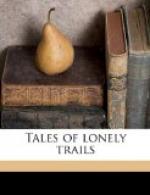A storm threatened. All the west was purple under on-coming purple clouds. At sight of this something strange and subtle, yet familiar, revived in me. It made me feel a little more like the self I thought I knew. So I watched the lightning flare and string along the horizon. Some time in the night thunder awakened me. The imminence of a severe storm forced us to roll out and look after the tent. What a pitch black night! Down through the murky, weird blackness shot a wonderful zigzag rope of lightning, blue-white, dazzling; and it disintegrated, leaving segments of fire in the air. All this showed in a swift flash—then we were absolutely blind. I could not see for several moments. It rained a little. Only the edge of the storm touched us. Thunder rolled and boomed along the battlements, deep and rumbling and detonating.
No dust or heat next morning! The desert floor appeared clean and damp, with fresh gray sage and shining bunches of cedar. We climbed into the high cedars, and then to the pinons, and then to the junipers and pines. Climbing so out of desert to forestland was a gradual and accumulating joy to me. What contrast in vegetation, in air, in color! Still the forest consisted of small trees. Not until next day did we climb farther to the deepening, darkening forest, and at last to the silver spruce. That camp, the fifth night out, was beside a lake of surface water, where we had our first big camp-fire.
September twenty-first and ten miles from Beaver Dam Canyon, where a year before I had planned to meet Haught this day and date at noon! I could make that appointment, saddle-sore and weary as I was, but I doubted we could get the wagons there. The forest ground was soft. All the little swales were full of water. How pleasant, how welcome, how beautiful and lonely the wild forestland! We made advance slowly. It was afternoon by the time we reached the rim road, and four o’clock when we halted at the exact spot where we had left our wagon the year before.
Lee determined to drive the wagons down over the rocky benches into Beaver Dam Canyon; and to that end he and the men began to cut pines, drag logs, and roll stones.
R.C. and I rode down through the forest, crossing half a dozen swift little streams of amber water, where a year before all had been dry as tinder. We found Haught’s camp in a grove of yellowing aspens. Haught was there to meet us. He had not changed any more than the rugged pine tree under which a year past we had made our agreement. He wore the same blue shirt and the old black sombrero.
“Hello Haught,” was my greeting, as I dismounted and pulled out my watch. “I’m four hours and a quarter late. Sorry. I could have made it, but didn’t want to leave the wagons.”
“Wal, wal, I shore am glad to see you,” he replied, with a keen flash in his hazel eyes and a smile on his craggy face. “I reckoned you’d make it. How are you? Look sort of fagged.”




